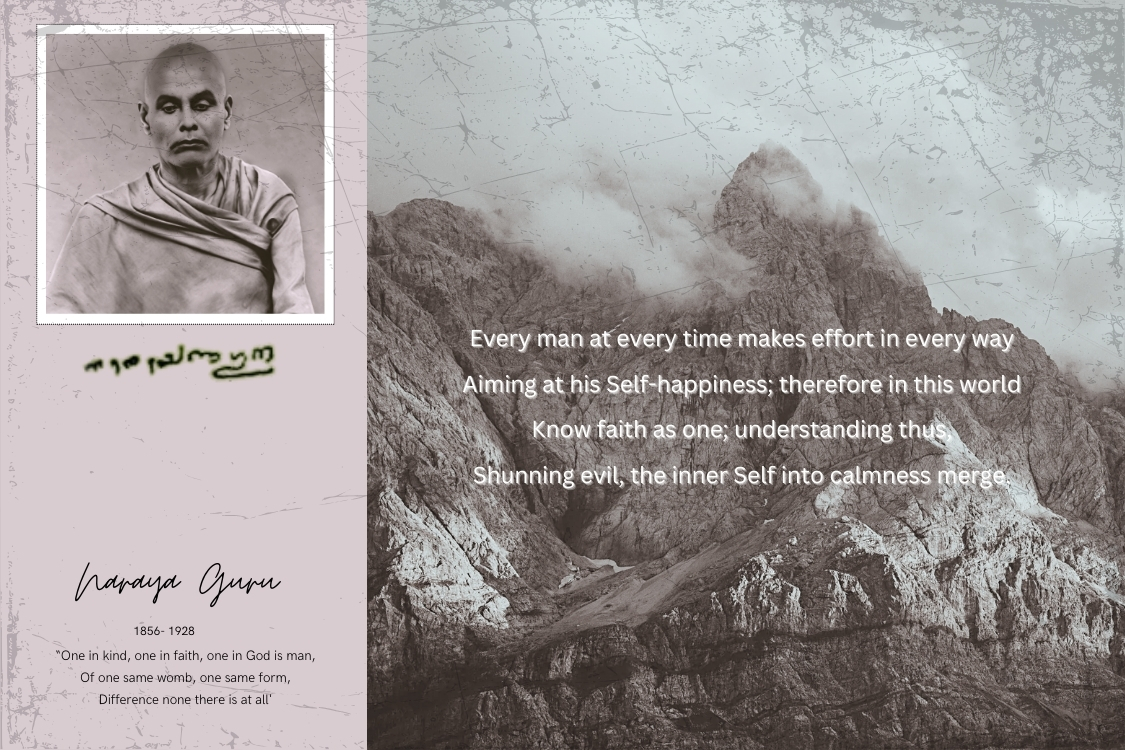NG a global
Narayana Guru: A Global Philosopher for the Modern World
Narayana Guru stands as a figure whose true significance extends far beyond the boundaries of social reformation and religious leadership. Emerging in the late 19th century in Kerala, India, his impact was profound not only as a social reformer but also as a philosopher of immense depth and universal relevance. His teachings invite us to see him as a thinker of global stature, one who articulates a “Word-wisdom” that transcends cultural, temporal, and geographic boundaries.
Central to understanding Narayana Guru’s philosophical contributions is the concept of “Word-wisdom” — a framework that transcends the conventional boundaries of thought and expression. This wisdom represents a universal norm for philosophical thinking, grounded in the fundamental truth that all human interests converge in the Self. This principle echoes through history, from Protagoras’s assertion that “Man is the measure of all things” to the Delphic oracle’s command to “Know Thyself.” Narayana Guru placed the contemplative search for self-knowledge above ritual or institutional religion, offering a vision of spirituality that is inclusive and timeless.
Narayana Guru’s approach to religion was revolutionary in its simplicity and profundity. His famous statement, “Whichever the religion, it suffices if it makes a better man,” reveals his understanding of religion not as a set of rigid doctrines but as a path to human elevation. True to the archetype of the Guru, Narayana Guru reasserted the timeless “Guru Word” with meticulous fidelity, adjusting it for the needs of his era.
The writings of Narayana Guru present a unique challenge to modern understanding. They contain symbols and paradoxes that demand scrutiny through both ancient Eastern wisdom and contemporary global knowledge systems. He understood the “Word” as more than mere speech; it was the profound medium through which the ends and means of human experience were reconciled. For him, “Word-wisdom” symbolizes both cosmic order and personal truth, transcending utilitarian concepts. It is a shared heritage, a boundless source of insight uniting all genuine seekers across time and culture.
Through his teachings, Narayana Guru reconciled the dualities of ‘ends’ and ‘means,’ emphasizing that neither should dominate human pursuits. His wisdom reconfigures values, suggesting that true fulfilment lies in Self-realization — a silence beyond thought and speech. This comprehensive methodology aligns with the Advaita Vedanta tradition, emphasizing a non-dual reality that abolishes all distinctions and affirms a universal integrity. Narayana Guru’s Vedantic methodology was systematic, introspective, and holistic, focusing not merely on theoretical knowledge but on the lived experience of wisdom.
Narayana Guru’s genius lay in his ability to include all aspects of human experience within the scope of his contemplative philosophy. He managed to bring under unified scrutiny what had been the subject of endless discussion and debate. His perspective remained consistently grounded in timeless truths, offering a deeply reflective and balanced view of life that transcended the fleeting nature of daily events. His approach was dialectical, aiming to reconcile subject and object while promoting a neutral, absolutist way of life that transcended divisive biases.
To fully appreciate the transmission of this wisdom, it is essential to understand the role of a true disciple. The depth of “Word-wisdom” can only be preserved and effectively communicated when the disciple truly understands and embodies the teachings. This connection between guru and disciple ensures that the integrity of Narayana Guru’s wisdom remains intact, allowing it to continue guiding future generations. The relationship between guru and disciple is one of the vital elements that support the lamp of wisdom, ensuring its light can illuminate the path for future generations.
Narayana Guru’s teachings challenge us to revisit fundamental questions about existence, human purpose, and the nature of wisdom itself. His work embodies a contemplative, all-embracing philosophy rather than a dogmatic or ritualistic path. The term “wisdom” in his teachings is not just a collection of truths; it is a dynamic process of realization that transcends conventional knowledge. This “Word-wisdom” serves as both a bridge and a beacon, guiding humanity toward a deeper understanding of itself.
Systematically abolishing duality, according to Narayana Guru, required a methodology and epistemology rooted in Advaita Vedanta. Without such a framework, the pursuit of non-duality could easily devolve into dogmatism. In Narayana Guru’s “Word-Wisdom,” also referred to as Atma-Vidya (Self-knowledge) or Brahma-Vidya (knowledge of the Absolute), there lies an intrinsic recognition of human values. This science is inherently personal — it involves the inner transformation of the individual, making the human personality an integral part of its scope of inquiry.
Thus, Narayana Guru’s methodology sought reality first through its immediate existent aspect, then through its rational understanding, and ultimately as a value for human life. He emphasized an ontological approach without invoking transcendentalism at the outset, focusing instead on the simple, existent reality that resonates with public common sense. His methodology invited individuals to recognize truth not as an abstract or external object but as something intimately connected with their own being.
Narayana Guru’s teachings continue to resonate across the world today, offering a path that transcends the limitations of conventional knowledge systems. Through Nataraja Guru’s efforts, these teachings have been preserved, analysed, and presented in a way that makes them accessible to a global audience. Together, they offer a vision of life that harmonizes the spiritual and the practical, the individual and the collective, guiding humanity towards a more enlightened and harmonious existence.




















1 Comment
admin
March 2, 2025hi